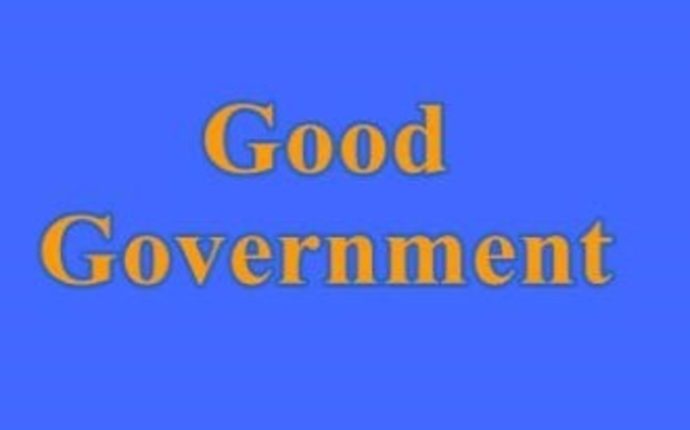Structural Requirements of Good Government
Good Government
Good government is one that secures and preserves the life and liberty of the People, secures justice, and continually strives to form a more perfect union.
Good government is continually threatened by people that seek to use the legislative and financial power of government for their own benefit, to the detriment of the People.
Good government must be prepared for these inevitable threats and be able to resist and remove them when they arise.
Some characteristics that I think are necessary for good government follow. Other necessary characteristics will inevitably arise over time.
Members of the Legislature elected from electorates primarily defined and limited by area.
A single electorate electing all members of parliament will ensure that all population and political power in a state is eventually concentrated into one centre, to the detriment of the people living in the other areas. This unsatisfactory situation was recognized at the time of the formation of all the States and of the Federal government.
At State and Federal level, one attempt to counter this was the formation of multiple electorates of defined geographical area based on equal population. At Federal level an additional attempt was the formation of the Senate consisting of twelve senators per state, regardless of the state’s population. These were all attempts to ensure that the people in all areas of the state (both State and Federal) were satisfactorily represented.
While at Federal level the States have been protected to some degree by their equal number of senators, at state level these attempts have failed. For example, the N.S.W electorate of Barwon now contains approximately 47% of the area of the state, with the neighbouring electorate of Murray containing a further 13%. The people in approximately 60% of the area of the state have only 2.1% of the members of the Legislative Assembly. This is self-evidently not representative.
To ensure that the People in all areas of the state are effectively represented, the electorates of each member of parliament need to be primarily defined and limited by area, and then by population.
The proposal to limit the area of electorates to no more than 10% of the area of the state will ensure the people in all areas are effectively represented regardless of population. The proposal to add electorates for every 10,000 voters will allow additional representation for the more highly populated areas. The proposal to limit the number of electorates to no more than 10 in 10% of the area of the state will ensure that while one densely populated city or area may evolve, the People from there will not be able to dominate the People in all the other areas.
Electorates defined primarily by area will prevent the re-creation in The Riverina of an unsatisfactory concentration of population and political power as in N.S.W and Victoria.
Term Limits
Term limits means that the Premier and all Members of the Legislature are limited to a defined maximum number of terms in government.
Term limits are essential for incorrupt government.
The Premier and Members are exposed to a continual procession of people seeking favour from them or from the government. They are also removed from the difficulties of the People, and so are likely to become increasingly insulated, isolated and eventually dispassionate about the suffering of the People.
The continual exposure to people seeking favour, and their increasing insulation and isolation from the People, ensures that the Premier and each Member will become increasingly incapable of governing for the benefit of the People.
In addition, it is probable that the Premier or Member will eventually use the legislative and financial power of The Riverina to serve himself rather than the People.
In addition, it is probable that the Premier or Member will eventually use the legislative and financial power of The Riverina to ensure he remains the Premier or Member in-fact permanently, preventing other more capable Premiers or Members from emerging.
In addition, a permanent Premier or Member causes complacency, or despair, among the People, both of which are currently, or eventually, detrimental to the People’s happiness.
The terms of possibly eight consecutive years (an eight year maximum cumulative term consisting of 2 x 4 year electoral cycles) and twelve years total (one additional 4 year term in government after having stood aside after eight years previously) are enough for the Premier or Member to either achieve or fail to achieve his objectives. After succeeding or failing, his reason for being Premier or Member is diminished, and it is beneficial to the People for the Premier or Member to stand aside and ensure a more capable Premier or Member emerges.
Election of the Premier by the People.
The election of the Premier by the People rather than by the Members of the Legislature ensures that the Premier is subject and servant of the People rather than of a majority faction of the Members of the Legislature, as is the case in N.S.W. and Victoria.
There are innumerable reasons and opportunities for formation of biased or corrupt legislation and expenditure of public money when the Premier is subject to the Members of the Legislature.
If the Members of the Legislature are empowered to elect the Premier, it is inevitable his election will eventually depend not on his service of the People but on his co-operation in awarding power and financial rewards to his supporters in the Legislature, or to the electors of supporting Members.
The appointing of Ministers from supporting Members in the Legislature, with the accompanying power and large pay rise, despite a lack of official qualifications or obvious experience or capability, and regular ‘reshuffles’, is the most obvious example of these Legislators being rewarded by the Premier.
The Premier separate from the Legislature.
The Premier governing separately from the Legislature will ensure that while his acts are restricted by law and tax and debt appropriations formed by the Members of the Legislature, he will not be subject to the Members, but rather, subject to the People who have elected him.
There are innumerable reasons and opportunities for biased or corrupt appointments and expenditure of public money when the Premier is part of, and subject to, a majority faction of the Members of the Legislature, as in N.S.W. and Victoria.
For example, the Members of the Legislature may elect and change the Premier at will depending on his co-operation in awarding power and financial rewards to his supporting Members or to the electors of supporting Members.
Having the Premier separate from the Legislature reduces any reason for, and probability of, biased or corrupt conduct between the Premier and the Legislature.
Election of the Premier
Each electorate shall cast one preferential vote for the election of the Premier. The preferential vote will be decided by the voters in each electorate. This is similar to the N.S.W. and Victorian systems where the Members of the Legislature elect the Premier, except it is the People from each electorate rather than the Member from each electorate voting.
If the Premier is elected by a basic popular vote, rather than by electorate, it is inevitable that his election will be entirely decided by the people in the most densely populated area. Consequently, to be elected, the incumbent Premier and other candidates will need to appeal to the People in the most densely populated area with all the financial and legislative power that they can, to the inevitable detriment of the People living in the other areas.
Having each electorate voting for the Premier will ensure that to be elected, the Premier will appeal to voters in all areas of the state, not merely the voters in the most densely populated area. It will also reduce the probability of the Premier using the financial and legislative power of The Riverina to bestow benefits on the People in one area for his own benefit, to the detriment of the People in the others.
If the votes of the electorates are equal for multiple candidates, the Legislature shall choose the Premier from these multiple candidates.
Ministers nominated by the Premier and confirmed by the Legislature.
The Premier nominating Ministers separate from the Members of the Legislature, yet with each Minister requiring confirmation by the Members, ensures that while Ministers are approved by the Premier and Members, they are not limited to Members of the Legislature as in N.S.W. and Victoria. This allows consideration of a vastly wider range of capable candidates, while removing the possibility of biased appointment of Members of the Legislature as an exchange of favours between the Premier and Members.
Judiciary
That governance include a Judiciary, separate from the Premier and Legislative Assembly, appointed by the Premier with the assent of the Legislative Assembly.
Protection against excessively unpopular governance
If the Premier, or the Legislature, is of the opinion that the other party is acting in an excessively unpopular style, either the Premier or the Legislature may enact an additional general election for both the Premier and the Members of the Legislature.
Having both parties subject to this election is to prevent corrupt and opportunistic abuse of this action by the enactor without any possible personal political adverse consequence.
Note
References to the male term He also refer to the female term She.


